If you are a pet bearded dragon owner, you might have noticed your pet puffing up its neck, beard, or entire body. Puffing up in bearded dragons is quite normal, and you need not panic. However, if your beardie puffs up several times in a day or for too long, you might wonder;
Why is my bearded dragon puffed up?
There are many reasons why a beardie might puff up. In general, these reptiles puff up when preparing for mating, eating, and during bath time. In addition, they may puff up to mark their territories, show dominance, or due to stress or fear. If your beardie is healthy and in suitable habitat, then there’s no reason to worry.
Most bearded dragons puff up their beards. But is it not uncommon for these lizards to puff up other body parts, including the neck.
The good thing is that puffing up is not just an indicator of negative situations. It indicates positive cases such as a show of excitement, as we will see below. Let us now explore the reasons why your beardie might be puffing up.
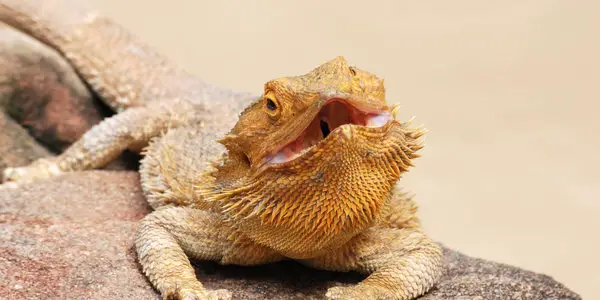
8 Reasons Bearded Dragons Puff Up:
1. Stress
Stress or fear is one of the main reasons why bearded dragons puff up. It is just like how dogs bark when stressed. Puffing up makes the lizard feel bigger and more threatening to the prey, acting as a survival and defense mechanism.
In addition to puffing up, stressed bearded dragons will develop a black beardie. Check the pet’s habitat to see if there is prey that is scaring them.
Some toys, especially new ones, might also scare the animal. Bearded dragons also don’t like seeing their reflection; if there is a mirror in the habitat, the pet might be stressed because of seeing its reflection.
Although sad, the other reason a beardie might puff up due to stress or fear might be because it is frightened of you.
Bearded dragons take time to adjust to new homes and their new owners. It will take time for the beardie to get accustomed to the new environment.
Spending more time with the pet will make it familiar and accustomed to your presence and scent. Familiarity reduces stress for the pet.
2. Breeding
Breeding is another reason why your bearded dragon might puff up. Although this is more common in both males and females, the behavior is more common among males.
They puff up to indicate to the female that they are ready to mate. It is also a show of dominance. When the females puff up their necks, it suggests that they are attracted to the male.
Bearded dragons have no specific breeding season, but most do so a few weeks after brumation, a period of reduced activities that bearded dragons enter during winter.
When the lizard puffs up due to breeding, it will also show signs of longer periods of sleep, less pooping, less movement, digging in the substrate, loss of appetite, and spending more time in the cooler part of the tank.
3. Feeding Time
Some experts believe that bearded dragons puff up during feeding to increase the room in their stomachs so as to eat more. It is likely true since bearded dragons have to fend for themselves in the wild. During seasons of scarcity, these reptiles need to eat as much as possible when they find food to last them longer.
To ascertain whether your bearded dragon is puffing up during mealtime to increase the capacity of its stomach, reduce the food potion you give the reptile.
Observe to see if the pet stops puffing up during meal times before readjusting the meal portions to the appropriate amount.
Further, your beardie could be puffing up during mealtime because, in the wild, these reptiles sometimes have to fight for the scarce food.
Instinctively, the lizard will still puff up even in captivity as a show of dominance, scare away other predators, even when there is none around, and intimidate the prey. You might notice this behavior when you give the bearded dragon live crickets.
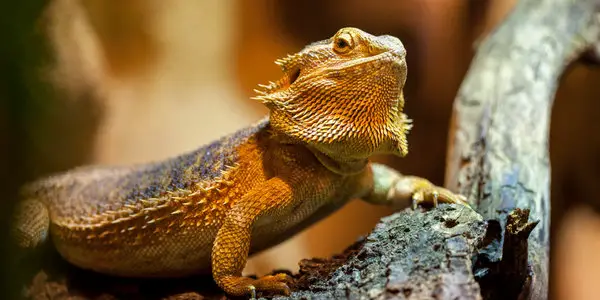
4. Shedding
Bearded dragons might also puff up when preparing to shed. It is a normal process that occurs to replace damaged skin or when there is growth in the size of the reptile. It takes 2 – 3 weeks for the full body to shed but can be shorter for babies and juveniles.
These reptiles can instinctively know when they are about to begin shedding.
Puffing up during this season is in an effort to quicken the process by loosening some skin. If your bearded dragon has dull-looking or waxy skin near the head, neck, or body, then the puffing up might be due to shedding.
It would help if you did not try to remove the old skin to help the beardie shed; its body knows what to do.
5. To Mark Territory
Reptiles are naturally territorial animals. They like having their space to themselves and don’t like sharing it with other animals, whether of the same species or not. If you have two male or two female bearded dragons in the same habitat, they will puff up to challenge each other.
A bigger beardie might also puff up to scare a smaller one irrespective of the sexes. In addition to puffing up, bearded dragons might also fight to mark their territory.
For this reason, you should keep your bearded dragons in different habitats. If you have to put them together, ensure that you provide them with enough space so that each lizard feels comfortable.
Even with a big enclosure, male bearded dragons are likely to fight over territory, and it is, therefore, not ideal to keep them together.
6. Bath Time
Bathing a bearded dragon keeps the animal clean and hydrated. Doing so once or twice a week is sufficient, and you should not wait till the animal is impacted to bathe it. The water should be warm and not hot to avoid burning the pet. They enjoy moving in shallow waters.
A bearded dragon will pull up during bath time if the water level is too high. The puffing up will be an attempt to help it float, and these reptiles have a natural fear of drowning. To avoid this, ensure that the bathing water is below the lizard’s shoulders.
7. Stretching
It is common for a human to feel pressure in the ears, especially when moving to higher altitudes. The same can happen to bearded dragons even when there is no change in height, and it can be uncomfortable. A bearded dragon will puff up with its mouth open to pressurize the ear canal.
In addition, it might just be stretching to relax the limbs, neck, and chest. Unlike human beings who stretch by moving their arms and limbs, bearded dragons will stretch by increasing the blood flow to various body parts, making their bodies puff up.
8. A Sign of Happiness
When a bearded dragon is excited or relaxed, it might puff up. It is a way for these reptiles to communicate their positive feelings. Puffing up out of excitement is common during playtime or when giving it treats. It is something you should be happy about.
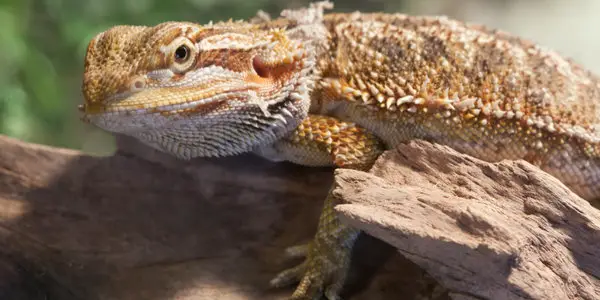
What to Do When Your Bearded Dragon Puffs Up?
Puffing up might make you worry if you are a new beardie owner, and it is understandable. The phenomenon is not common with most pets, but it is nothing to panic about.
Puffing up is an expression of how the bearded dragon feels and can help you know when you need to rescue the animal from a potential threat. It also helps them feel safer when under threat.
You don’t need to contact a vet right away; instead, you should establish why the beardie is puffing up. Here are helpful tips on how to help your puffing-up bearded dragon.
1. Provide a Suitable Habitat
Give the reptile a stress-free environment. It includes having the right accessories in the enclosure, a big enough tank, an ideal diet, and adding an ideal substrate.
Look out for stress factors such as another pet being around the beardie’s habitat, poor habitat conditions such as a too-small tank, a mirror, some toys, etc.
If you identify any, remove or change the same so that the animal is no longer stressed.
2. Bond With the Bearded Dragon
Bearded dragons do not interact with humans in their natural environment. Therefore, it is understandable that your pet is scared of you and its new home. Bond with the pet to make it feel comfortable and stop puffing up.
Bonding with a bearded dragon can include activities such as offering them treats using your hands, playing with the animal, and getting them out of the cage.
It is a slow process that requires your commitment and patience, but in the end, it is rewarding.
3. Help With the Shedding Process
You should not rip off the skin of the bearded dragon. The skin will fall off on its own. However, you can help the lizard with the shedding process by bathing them and providing enough room to move around. In addition, you can add rough-textured fabrics in the enclosure for them to rub up against.
Identifying why your beardie is puffing up will help you know how to support the pet. If the lizard remains puffed up for a long time, then you may contact a vet.
The professional will hardly give any medication but will instead guide you on how to care for the beardie to keep it healthy effectively.
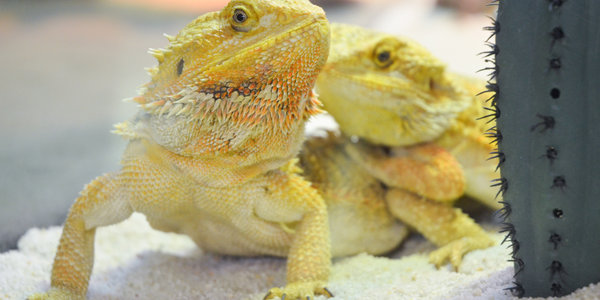
Frequently Asked Questions
Why Is My Bearded Dragon Flaring?
Stress is the most common reason why bearded dragons flare. It is a defense mechanism that makes the pet feel bigger and as a threat to the potential predator. Other reasons why a bearded dragon might flare include frightening another beardie in the same habitat, breeding, eating, quickening the shedding process, or feeling the threat of drowning during bath time.
Why Is My Baby Bearded Dragon Puffing Up the Beards?
Baby bearded dragons puff up their beards quite often. It is more common among those that have just been taken to a new home. A baby beardie can also frequently puff up the beards if they do not feel safe. Accessories such as toys can scare the baby, but with time it will soon realize that they are not actual threats.
It is vital that you help your baby bearded dragon settle in its new home and feel secure. Bonding by giving it treats with your hands, bathing it, and touching it from time to time will go a long way.
Such activities make the beardie feel calm, and this will help them reduce the puffing up of the beards.
Is Puffing Up Unhealthy for My Bearded Dragon?
The quick answer is no; puffing up is not unhealthy for your beardie. It is a natural ability that the reptile uses when necessary. It acts as a defense mechanism when the reptile is frightened or threatened.
In captivity, you should be on the lookout for situations that make the lizard uncomfortable. When the beardie puffs up due to fear, intimidation, threat, or stress, it is not healthy, and you should avoid such situations. Find out the underlying cause and eliminate it.
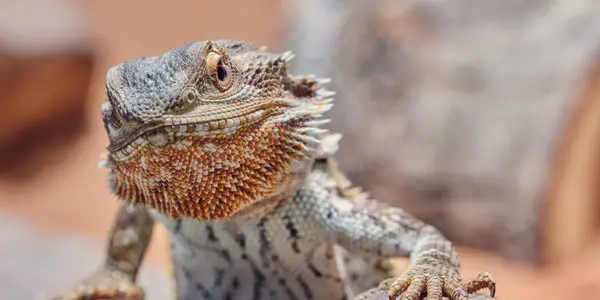
Conclusion
Puffing up is a natural ability in bearded dragons that helps them express how they feel. A beardie will puff up when threatened, stretching, pressurizing the ear canal, bath time, meal times, or even shedding.
It is worth noting that a bearded dragon puffing is hardly a danger sign. As such, you should not take the pet to the vet right away but instead establish the underlying reason for the behavior.
Only when the beardie puffs up for an extended period should you seek professional help. The vet will guide and help establish the underlying cause of the puffing up.